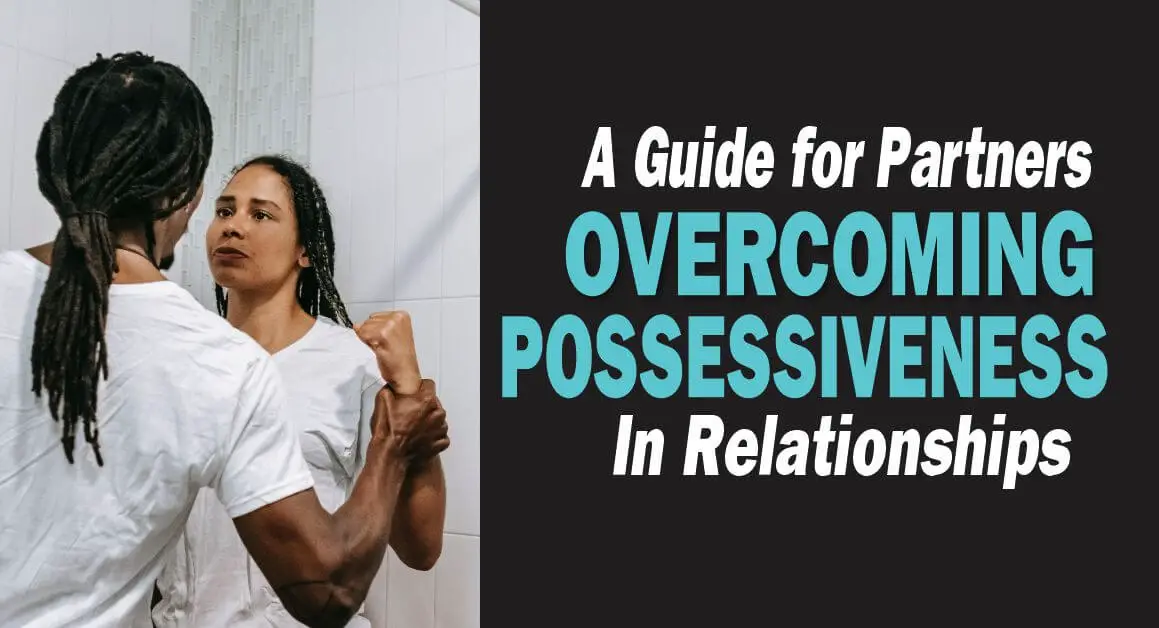Possessiveness is natural but problematic if it leads to excessive control, emotional abuse, stalking, or physical violence in relationships that can lead to a challenging love life. Here is what to do.
Possessiveness in relationships can come from a desire for closeness but may become problematic if it leads to control or emotional strain.
Paying attention to the fine line between healthy attachment and harmful possessiveness is important.
It is not easy spotting a possessive relationship early on, but there are cues here and there to help identify the hidden red flags that characterize an imbalance in control in relationships.
This guide discusses effective strategies to address and overcome possessiveness, encouraging trust and mutual respect.
Related: Wading through Relationship Dynamics
You might want to pin the image below.

Key Takeaways
- Recognize the fine line between healthy attachment and harmful possessiveness in relationships.
- Understand the signs of possessiveness, such as monitoring, isolation, and jealousy, to address them early.
- Causes of possessiveness include insecurity, past experiences, fear of losing control, and mental health issues.
- Overcoming possessiveness involves open communication, setting boundaries, identifying triggers, and seeking counseling if necessary to build trust and respect.
Anecdote
We don’t go into a relationship having all our antennas up to dictate every red flag.
Even if we do, most signs are cloaked in layers of goodness that we let down our guards too soon.
This topic makes me remember an incident that happened back in my university days.
I had a lady in the neighbourhood that was cohabiting with a guy, an extremely possessive guy that seemed to be a placeholder in the lady’s life, and I never knew until things escalated.
The guy saw the lady with me and embarrassed us in an alley, I excused myself while they both nearly tore themselves apart.
An imbalance in control in relationships can escalate quickly, especially when infidelity is suspected.
This is a before-warned-is-to-before-armed post to help you identify the hidden signs as you wade through the usual goodness that characterizes new relationships, and also to manage a possessive situation.
Related: The Kind of Women Men Die to Have
What is Possessiveness in Relationships?
Possessiveness in relationships is defined as an excessive desire to control or own one’s partner, leading to feelings of jealousy, mistrust, and potentially abusive behaviors. It is characterized by an intense attachment that triggers volatile emotions when the perceived attachment is threatened, even if that threat is illusory.
Individuals need to recognize and address possessive behaviour before it escalates and leads to negative consequences.

What are Examples of Possessiveness?
Here are some examples of a partner being possessive in a relationship:
1. Constant Monitoring: Possessive partners frequently track their partner’s activities, demanding detailed explanations and becoming upset if not provided. This behavior indicates control and distrust, causing relationship stress.
2. Limiting Social Life: They may restrict their partner’s social interactions, forbidding certain friends or insisting on accompanying them, leading to isolation and resentment.
3. Refusing to Let Go of Past Relationships: Possessive individuals may dwell on their partner’s exes, causing jealousy and trust issues by trying to contact them or bring them up frequently.
4. Insisting on Constant Contact: They demand continuous communication, becoming upset if their partner does not respond quickly, which can lead to feelings of suffocation.
5. Extreme Jealousy: Possessive partners exhibit intense jealousy over their partner’s interactions with others, making baseless accusations of infidelity, which creates conflict and insecurity.
Related: Reasons for Exploitation of a Partner in Relationships
Related: Tips for Building Emotional Intimacy with Your Partner
Causes of Possessiveness

There are many causes of a partner trying to own the other absolutely, but the following are the most obvious:
1. Insecurity
Insecurity can lead to possessiveness as individuals seek control to reassure themselves of their partner’s affection. This may involve constant questioning, monitoring communications, or other controlling behaviors driven by a fear of abandonment or low self-confidence.
2. Past Experiences
Past experiences of cheating, abandonment, or rejection can lead to possessiveness, as individuals develop heightened jealousy and overprotectiveness to avoid a repeat of their past hurts.
3. Fear of Losing Control
Some people become possessive due to a fear of losing control in the relationship, often stemming from feelings of inadequacy or insecurity. When they sense their partner slipping away, they may intensify their possessive behaviors in an attempt to regain control.
4. Cultural and Societal Norms
Cultural and societal norms influence possessive behavior in relationships, with some cultures viewing it as love and devotion, while others see it as insecurity or control.
5. Lack of Trust
Lack of trust often leads to possessive behavior, where one partner monitors the other’s activities out of insecurity, which can further damage the relationship by eroding trust.
6. Attachment Anxiety
Attachment anxiety, stemming from faulty parenting and negative childhood experiences, can disrupt relationships in adulthood by undermining confidence and causing insecurity.
7. Fear of Abandonment or Betrayal
Fear of abandonment can lead individuals to engage in negative behaviors to keep their partner, often worsening the situation, such as a cheated partner becoming possessive out of insecurity.
8. Mental health issues
It can also be caused by a mental health issue like borderline personality disorder.
People who have this condition seem to experience constant mood swings as they show signs of ownership of their partner out of perceived abandonment.
9. Sense of superiority and entitlement as seen in most alpha humans
Some partners, particularly those with traditional masculine attitudes, may exhibit entitlement by controlling and dictating their partner’s actions to maintain dominance.
Related: Why Long-distance Relationships Flop
What are Signs of Possessiveness in Relationships?

Possessiveness in relationships can manifest in a variety of ways, from seemingly innocent gestures to more overtly controlling behaviors.
While some possessive behavior may be easy to overlook or dismiss:
1. Constant Need for Attention: Insecure partners may be excessively clingy, requiring constant contact and becoming upset if their partner spends time with others or is preoccupied.
2. Toxic Jealousy: Extreme jealousy involves constant suspicion and control over a partner’s interactions, manifesting as accusations or monitoring, often rooted in the possessive partner’s insecurities. Therapy can help to overcome this sign.
3. Isolation from Others: Possessive partners may restrict their partner’s social interactions to maintain control, leading to loneliness and loss of autonomy.
4. Forcing Reciprocation: A possessive partner may pressure you to reciprocate gestures and affections, using this to manipulate and secure the relationship.
5. Demanding Public Validation: They may insist on being prominently acknowledged in social settings to ensure exclusivity and validate their position in your life.
6. Controlling Behavior: Possessive partners often try to control their partner’s actions involving emotional manipulation, including who they see and what they do, leading to a loss of independence and increased anxiety.
7. Mood Swings: Frequent and intense mood changes in response to a partner’s actions, often driven by insecurity and jealousy, can lead to emotional manipulation and controlling behavior.
Related: The Dilemma of Whether to Walk Away After Infidelity
The Negative Effects of Possessiveness on Relationships
Here are some of the ways that unhealthy control can harm a relationship:
- Loss of Trust: Excessive control erodes trust by constantly questioning a partner’s actions and motives.
- Emotional Distress: Over-controlling behavior creates anxiety, fear, and emotional distress, leading to isolation and loneliness.
- Loss of Independence: Controlling actions result in a loss of autonomy and limit social connections and friendships.
- Isolation: Excessive control can isolate a partner from others, causing loneliness and difficulty maintaining social connections.
- Escalation to Abuse: Unchecked control can escalate to emotional or physical abuse, with serious long-term consequences.
Related: Thin Line Between Relationship Anxiety and Gut Feeling
The Importance of Avoiding Overprotectiveness in Relationships

Avoiding possessive behavior in relationships promotes trust, encouraging partners to feel secure and build strong emotional connections.
It allows for independence, enabling individuals to maintain their autonomy while enjoying time together and pursuing personal interests.
By encouraging open communication, partners can address misunderstandings and resolve issues before they escalate.
Additionally, steering clear of possessiveness nurtures mutual respect, as partners support each other’s goals and aspirations.
Ultimately, these practices foster healthy relationships built on trust, respect, and love, creating a solid foundation that can withstand life’s challenges and provide emotional security for both partners.
Related: Understanding Relationship Apprehension
How do you Deal with a Possessive Partner?

1. Recognize the Problem
Identify specific possessive behaviors like jealousy or controlling actions.
Communicate openly with your partner about how these behaviors impact your relationship and discuss solutions together.
2. Communicate Openly
Address possessiveness by expressing your feelings honestly, listening to your partner’s perspective, and avoiding blame.
Focus on mutual understanding and collaborative problem-solving to improve the relationship.
Also Read: Personal Boundaries and Why You Need them
3. Set Boundaries
Setting clear boundaries is an important part of addressing a controlling partner in relationships.
Setting boundaries involves limiting behaviors like monitoring phone use or controlling time with others to ensure mutual respect and safety in the relationship.
4. Identify Your Triggers
To effectively address possessiveness in relationships or marriages, it’s important to first identify the specific behaviors or situations that trigger it in yourself or your partner.
This means taking the time to reflect on past experiences and patterns of behavior that have led to the problem.
The next step can be counseling if reassuring your partner doesn’t help their possessiveness. This might aid them in resolving old problems. Couples therapy might be helpful for both of you.
5. Beware of Possessive People
When starting a new relationship, you should constantly be aware of the warning signals because possessive relationships may be extremely dangerous.
The unhealthy attitude from your lover may at first seem romantic. After all, it’s exhilarating to meet someone who desires your exclusive attention.
However, as things go on, you can discover that your freedom is being constrained.
You should be cautious if you ever start to notice that your partner gets upset easily when you bring up other individuals in your life.
You should seek help from a third party as soon as you can if you feel that your time with friends and family is being restricted and you’re afraid to speak up to your partner.
You should not wait for things to degenerate into abuse because it almost always does.
Related: Taking a Break in a Relationship: Yay or Nay?
Frequently Asked Questions
What causes possessiveness?
Possessiveness often stems from insecurity, past traumas, fear of abandonment, cultural norms, and lack of trust. These factors lead to excessive control and jealousy.
How do you end a relationship with a possessive person?
To end a relationship with a possessive person, communicate clearly, set firm boundaries, seek support, and prioritize your safety. Be honest and assertive about your decision.
Why am I so jealous and possessive?
Jealousy and possessiveness may arise from insecurities, past experiences, or unmet emotional needs. Addressing these underlying issues through self-reflection or therapy can help manage these feelings.
How to handle a possessive girlfriend?
Handle a possessive girlfriend by setting clear boundaries, communicating openly about feelings, and encouraging trust-building activities. Seek couples therapy if needed to address underlying issues.
Conclusion
Possessiveness in relationships, though often rooted in a desire for closeness, becomes problematic when it leads to excessive control and emotional or physical harm.
Recognizing signs such as jealousy, isolation, and controlling behaviors is crucial for addressing the issue.
Open communication, setting boundaries, and seeking professional help can help manage and mitigate possessiveness.
By encouraging trust, respect, and independence, partners can maintain a healthy, supportive relationship free from harmful control.
REFERENCE
- 7 Sings Of A Possessive Relationship That Can Easily Grow Into Abuse
- 12 Ways To Stop Being Possessive
- What Really Causes Possessiveness In Relationships
- Feeling possessive? 8 ways to overcome it and be a loving
- Overcoming Jealousy In Your Marriage
Pious Clements is the insightful voice behind "The Conducts of Life" blog, where he writes about life ethics, self-development, life mastery, and the dynamics of people and society.
With a profound understanding of human behaviuor and societal dynamics, Pious offers thought-provoking perspectives on ethical living and personal growth.
Through engaging narratives and astute observations, he inspires readers to navigate life's complexities with wisdom and integrity, encouraging a deeper understanding of the human experience and our place within society.

This is such a detailed and thorough post on overcoming possessiveness in a relationship. Practical examples. Learned a ton. Thanks for sharing!
Thank you Hari for your thumbs up. I appreciate.
You are welcome Hari. I am glad you found the post useful.
This information is vital. Thank you for taking the time to put this together. Awesome post!
Thanks, Nisee.